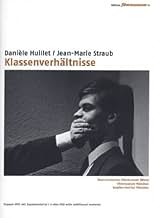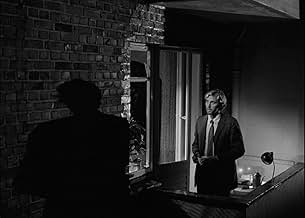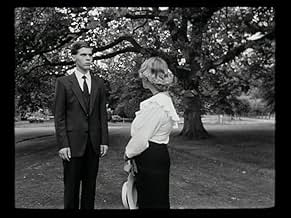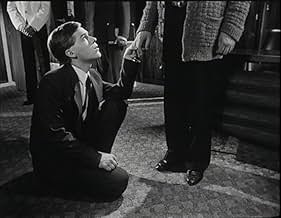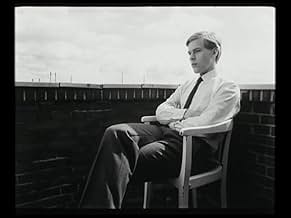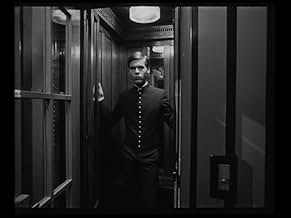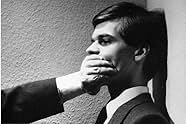VALUTAZIONE IMDb
6,8/10
816
LA TUA VALUTAZIONE
Aggiungi una trama nella tua linguaAfter making the domestic servant pregnant, a woman who doubles his age, a young man of only seventeen years from the German bourgeoisie is sent by his family to the United States in order t... Leggi tuttoAfter making the domestic servant pregnant, a woman who doubles his age, a young man of only seventeen years from the German bourgeoisie is sent by his family to the United States in order to avoid a huge scandal.After making the domestic servant pregnant, a woman who doubles his age, a young man of only seventeen years from the German bourgeoisie is sent by his family to the United States in order to avoid a huge scandal.
- Regia
- Sceneggiatura
- Star
- Premi
- 2 vittorie e 2 candidature totali
Gérard Samaan
- Schubal
- (as Gérard Semaan)
Willi Vöbel
- Pollunder
- (as Villi Vöbel)
Recensioni in evidenza
Only a handful of directors have attempted to adapt Kafka to the screen:Welles with "The Trial" and Haneke with "The Castle" being the two most successful,but this adaptation of his unfinished novel "Amerika" is perhaps the best. "Amerika" was always Kafka's most approachable novel without many of the labyrinthine plots and tortured characters of the other novels and the Straubs certainly approach it with the utmost fidelity. It is the story of Karl Rosmann,a German youth who after getting a servant-girl into trouble is sent by his parents to find work in America.Like the novel,the film proceeds with a series of picaresque episodes recounting his travails first in staying with his wealthy uncle and then finding employment in a large opulent hotel. The Straubs' minimalist style of long takes combined with static camera-work is preserved but the habitually expressionless acting style of their usually non professional cast is here combined with a more declamatory,theatrical style of acting favoured by some of the more experienced members of the cast,notably Laura Betti,and unlike many of their more hermetic film,this can be enjoyed by audiences as a much more straightforward exercise in the pleasures of narrative film-making.
10zoe-66
This is one of the great films of the 20th century. It is extraordinary and inspiring. It is simple, clear and to the point - it is also transcendent.
The film is based on Kafka's unfinished novel "Amerika". It was shot in Europe which is appropriate since Kafka never visited America and the novel is not about the real United States but it is rather a kind of allegory. Straub and Huillet's version is indeed about class relations and about the society that is created by capitalism, which is utterly cruel, capricious and ludicrous.
One interesting aspect is that it appears to take place at no specific time in history. It is neither exactly in the present or the past. Rather the characters wear the costumes that best express their position in society, whether it is a nouveau riche industrialist in a large vulgar 1970's bow tie or a policeman in the uniform of the Keystone Kops .
The film is photographed beautifully and simply in black and white. The framing and relationship between shots tells you everything about the relationship between the characters. For example there are long passages of shot/reverse shot with no resolution or establishing shot. It shows us how disconnected the protagonist, Karl Rossman is from the world around him.
There are some interesting actors in the film, note for example Laura Betti who was in many Pasolini films. Also the director Harun Faroki plays one of the characters.
I only wish more of Straub/Huillet's work was available in the USA.
The film is based on Kafka's unfinished novel "Amerika". It was shot in Europe which is appropriate since Kafka never visited America and the novel is not about the real United States but it is rather a kind of allegory. Straub and Huillet's version is indeed about class relations and about the society that is created by capitalism, which is utterly cruel, capricious and ludicrous.
One interesting aspect is that it appears to take place at no specific time in history. It is neither exactly in the present or the past. Rather the characters wear the costumes that best express their position in society, whether it is a nouveau riche industrialist in a large vulgar 1970's bow tie or a policeman in the uniform of the Keystone Kops .
The film is photographed beautifully and simply in black and white. The framing and relationship between shots tells you everything about the relationship between the characters. For example there are long passages of shot/reverse shot with no resolution or establishing shot. It shows us how disconnected the protagonist, Karl Rossman is from the world around him.
There are some interesting actors in the film, note for example Laura Betti who was in many Pasolini films. Also the director Harun Faroki plays one of the characters.
I only wish more of Straub/Huillet's work was available in the USA.
Pretty good.
Was surprised to find out about this one. Very rationalistic film making. Kind of Brechtian.
I am really fond of the way the actors just recite their lines as opposed to act them, i also really liked the way it was shot, its static quality was very comforting for me even though this film is anything but comforting. It has, like everything i have read so far from kafka, this nightmare-ish feel to it. Everything always spirals down, everyone is alienating and confusing, every action has a undoable consequence. This time however, it is all in the context of a german immigrant in the united states who, deprived of his nationality becomes a sort of sub proletariat. But being him from a bourgeoise bringin he refuses to accept that fate which only makes thing worse for him. To me the point seems to be the impossibility of a decent living under the capitalist system or at least the easiness of the marginalization by it.
The film was really good, i am really glad i got to see it. It is a really tough watch though. The scene where he is let go of his job in the hotel was one of the most frightening scenes i have ever watched in my whole life.
Franz Kafka began to work in a novel he referred to as Der Verschollene (the missing man) in 1912. The work was published in 1927, three years after Kafka's death by his friend and amanuensis Max Brod, who did some heavy editing of the manuscript pages and changed the title to Amerika. The book was possibly incomplete, Kafka having stated his intention of adding more chapters. It deals with the travails of 16 year old Karl Rossmann, expelled from his father's house in Germany and sent to America after being seduced by a maid in an encounter that left her pregnant.
The scenario of Karl's adventures is Amerika, a nightmare version of America with enormous, forbidding buildings shown in long lateral dolly shots, monstrous industrial structures with no relation to people, streets either deserted or traversed by grotesque political parades and highways without beginning or end with cars speeding in both directions oblivious of each other. In Amerika, Karl endures numerous setbacks; he falls from grace with his uncle and is betrayed and humiliated time and again by false friends. However, he is also helped by the kindness of various strangers and he never loses his good nature or his desire to help others. Karl ends up finding work in an enormous traveling circus/theater called the Great Theater of Oklahoma and the last scene in the novel shows him watching the landscape from a window of the train that is transporting the entire Theater towards the West.
In spite of its reputation as incomplete, Amerika has a definite ending. The register changes abruptly when Karl applies for a job at the Theater. Conflicts and frustrations disappear, and the Theater (qualified by Kafka as "almost unlimited") has a place for everyone, regardless of abilities. This suggests that the Theater is either Paradise or its earthly introduction. This interpretation is in fact Kafka's own; in conversation with Brod he insinuated that the Theater was Karl's mission, his freedom, his destiny and that he even saw there again, as if by heavenly magic, his parents and his homeland.
Directors Jean-Marie Straub and Danièle Huillet have chosen a different, Marxist interpretation. According to them "For Kafka, the law has nothing to do with God, it is the law of classes and the separation of society in classes." Within this framework, Straub and Huillet peculiar direction make sense.and the hero's adventures may be understood in terms of class differences (which explains the title). Actors deliver their lines in a stilted, unnaturally clear diction that somewhat suits the dialogue, where logical constructs are built upon absurd foundations. All in all, the movie delivers a fresh view of the novel. Two objections: the Statue of Liberty in the novel (but not in the movie) wields a sword, not her usual torch and the almost paradisiacal landscape in the last scene of the novel comes out on film as a somewhat dull view of the muddy Missouri River.
The scenario of Karl's adventures is Amerika, a nightmare version of America with enormous, forbidding buildings shown in long lateral dolly shots, monstrous industrial structures with no relation to people, streets either deserted or traversed by grotesque political parades and highways without beginning or end with cars speeding in both directions oblivious of each other. In Amerika, Karl endures numerous setbacks; he falls from grace with his uncle and is betrayed and humiliated time and again by false friends. However, he is also helped by the kindness of various strangers and he never loses his good nature or his desire to help others. Karl ends up finding work in an enormous traveling circus/theater called the Great Theater of Oklahoma and the last scene in the novel shows him watching the landscape from a window of the train that is transporting the entire Theater towards the West.
In spite of its reputation as incomplete, Amerika has a definite ending. The register changes abruptly when Karl applies for a job at the Theater. Conflicts and frustrations disappear, and the Theater (qualified by Kafka as "almost unlimited") has a place for everyone, regardless of abilities. This suggests that the Theater is either Paradise or its earthly introduction. This interpretation is in fact Kafka's own; in conversation with Brod he insinuated that the Theater was Karl's mission, his freedom, his destiny and that he even saw there again, as if by heavenly magic, his parents and his homeland.
Directors Jean-Marie Straub and Danièle Huillet have chosen a different, Marxist interpretation. According to them "For Kafka, the law has nothing to do with God, it is the law of classes and the separation of society in classes." Within this framework, Straub and Huillet peculiar direction make sense.and the hero's adventures may be understood in terms of class differences (which explains the title). Actors deliver their lines in a stilted, unnaturally clear diction that somewhat suits the dialogue, where logical constructs are built upon absurd foundations. All in all, the movie delivers a fresh view of the novel. Two objections: the Statue of Liberty in the novel (but not in the movie) wields a sword, not her usual torch and the almost paradisiacal landscape in the last scene of the novel comes out on film as a somewhat dull view of the muddy Missouri River.
Lo sapevi?
- QuizThe only film performance of Christian Heinisch.
- ConnessioniReferenced in Jean-Marie Straub und Danièle Huillet bei der Arbeit an einem Film (1983)
I più visti
Accedi per valutare e creare un elenco di titoli salvati per ottenere consigli personalizzati
- How long is Class Relations?Powered by Alexa
Dettagli
- Tempo di esecuzione2 ore 6 minuti
- Colore
- Mix di suoni
- Proporzioni
- 1.37 : 1
Contribuisci a questa pagina
Suggerisci una modifica o aggiungi i contenuti mancanti

Divario superiore
By what name was Rapporti di classe (1984) officially released in India in English?
Rispondi
